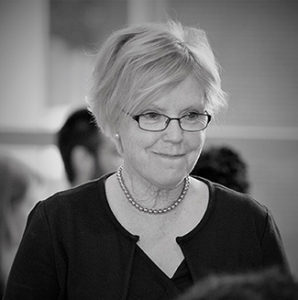Meet Kate

Photo credit: Courtesy of the University of Delaware
A Jersey girl by birth, Kate Szegda grew up in small towns: Highland Park and Point Pleasant Beach, New Jersey. As a kid, she played the trumpet and loved riding bikes, ice skating, and reading Nancy Drew mysteries. In high school, she worked on the boardwalk selling penny candy.
After earning a degree in English and education, Kate married her college sweetheart. They have two grown children, and over the years, they’ve had three Labrador retrievers. Their current lab, Emma, often interrupts Kate’s writing to remind her that it is time to play.
As a grown up, Kate taught middle-school language arts and loved reading books with her students. Two favorites were Johnny Tremaine and Roll of Thunder, Hear My Cry. Historical fiction. No surprise there. Other favorites were Holes and Charlie and the Chocolate Factory.
Now, thanks to COVID-19, favorite pastimes like travel have been limited. Luckily, Kate says, there is still golf, reading, and writing. A reader of middle-grade fiction, she loves an afternoon with a good book. But, for Kate, writing Pharmacy Girl has been the best experience yet. According to Kate, historical research—especially about your own family— is a lot like being a detective, and that, she says, is fun.
What’s next? Sharing her writing experiences and her book with you.
Why did I write Pharmacy Girl?
Pharmacy Girl was written before COVID-19. Originally a cautionary tale, PG was written to help a future generation. I never dreamed the book would be so relevant so soon. No longer just a cautionary tale, PG is a story of hope and resilience that might help young readers cope with our own pandemic.
What prompted me to write about Spanish influenza in the first place? A hard question to answer because there is more than one reason. So, I think I’ll just talk about three. One, I love history. Two, stories of my family inspired me to follow in their footsteps. And three, I have a story to tell that I think you’ll want to read.
I wrote Pharmacy Girl because I was fascinated with the stories my mother told about Spanish influenza. She was only four when she had the flu. It must have been a memorable experience for her since she talked about it so many years later. I wondered just how bad influenza could have been. Thanks to her stories, I came to love history because I can think about world events from the perspective of real people…my family. That connection makes history tangible and engaging. I hope some of my passion will inspire young readers to see history in a personal way.
I wrote Pharmacy Girl because my family inspired me. My grandfather owned his own pharmacy and was active in civic affairs. My grandmother worked in the store with him. Together they encouraged both my mother and my aunt to be the first in the family to go to college. Aunt Juanita went to Rutgers Pharmacy School when few women went into sciences. My great-grandmother delivered babies, and my great-great grandmother came from Ireland by herself and then sent for my great-great grandfather, who—as the story goes—left his weaving on the loom and came to America.
Pharmacy Girl is a story of optimism and hope. It is a story I just had to tell.
